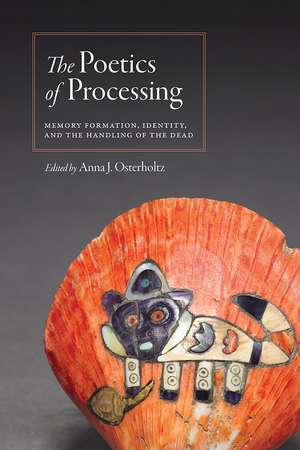The Poetics of Processing: Memory Formation, Identity, and the Handling of the Dead
Editat de Anna J. Osterholtzen Limba Engleză Hardback – 30 noi 2020 – vârsta ani
The contributors interpret postmortem treatment of the physical body through a poetics lens, examining body processing as a mechanism for the re-creation of cosmological events and processing’s role in the creation of social memory. They analyze methods of processing and the ways in which the living use the physical body to stratify society and gain power, as evidenced in rituals of body preparation and burial around the world, objects buried with the dead and the hierarchies of tomb occupancy, the dissection of cadavers by medical students, the appropriation of living spaces once occupied by the dead, and the varying treatments of the remains of social outsiders, prisoners of war, and executed persons.
The Poetics of Processing combines social theory and bioarchaeology to examine how the living manipulate the bodies of the dead for social purposes. These case studies—ranging from prehistoric to historic and modern and from around the globe—explore this complex material relationship that does not cease with physical death. This volume will be of interest to mortuary archaeologists, bioarchaeologists, and cultural anthropologists.
Contributors:
Dil Singh Basanti, Roselyn Campbell, Carlina de la Cova, Eric Haanstad, Scott Haddow, Christina Hodge, Christopher Knusel, Kristin Kuckelman, Clark Spencer Larsen, Debra Martin, Kenneth Nystrom, Adrianne Offenbecker, Megan Perry, Marin Pilloud, Beth K. Scaffidi, Mehmet Somel, Kyle D. Waller
Preț: 481.27 lei
Preț vechi: 523.12 lei
-8% Nou
Puncte Express: 722
Preț estimativ în valută:
92.09€ • 100.35$ • 77.60£
92.09€ • 100.35$ • 77.60£
Cartea se retipărește
Doresc să fiu notificat când acest titlu va fi disponibil:
Se trimite...
Preluare comenzi: 021 569.72.76
Specificații
ISBN-13: 9781646420605
ISBN-10: 1646420608
Pagini: 276
Ilustrații: 38
Dimensiuni: 152 x 229 x 20 mm
Greutate: 0.51 kg
Ediția:1
Editura: University Press of Colorado
Colecția University Press of Colorado
ISBN-10: 1646420608
Pagini: 276
Ilustrații: 38
Dimensiuni: 152 x 229 x 20 mm
Greutate: 0.51 kg
Ediția:1
Editura: University Press of Colorado
Colecția University Press of Colorado
Recenzii
“An important and interesting take on mortuary/body processing/manipulation of human remains after death.”
—Sara Becker, University of California, Riverside
“There is much the study of dead bodies—physical and mortuary remains—can tell us about social structures and the creation (or reproduction) of social memories.”
—Pamela Geller, University of Miami
“The Poetics of Processing is a well-written, authoritative volume that demonstrates significant flexibility when applied to varied historical and cultural contexts and highlights the poetics model as a powerful means for investigating identity and memory in past societies.”
—American Anthropologist
—Sara Becker, University of California, Riverside
“There is much the study of dead bodies—physical and mortuary remains—can tell us about social structures and the creation (or reproduction) of social memories.”
—Pamela Geller, University of Miami
“The Poetics of Processing is a well-written, authoritative volume that demonstrates significant flexibility when applied to varied historical and cultural contexts and highlights the poetics model as a powerful means for investigating identity and memory in past societies.”
—American Anthropologist
Notă biografică
Anna J. Osterholtz is assistant professor of anthropology in the Department of Anthropology and Middle Eastern Cultures at Mississippi State University. She is a specialist in the analysis of commingled and fragmentary human remains and how the body can be manipulated for social ends. She has developed a recording system for commingled remains that has been used in Europe, the UAE, and the Americas. She maintains active research programs in both Croatia and Cyprus.
Descriere
The Poetics of Processing combines social theory and bioarchaeology to examine how the living manipulate the bodies of the dead for social purposes.
